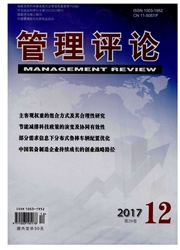

 中文摘要:
中文摘要:
为切实保护中小股东利益,股权分置改革是我国二元股权结构的上市公司改革的必然之路,文章研究了股权分置改革前和改革过程中,作为中小股东代表的机构投资者对公司业绩的不同影响。首先从机构持股比例和持股的机构数量两方面研究了机构投资者与公司业绩的关系,发现当机构持股比例较高时,持股机构数目越多,公司绩效越好,而在机构持股比例较低的一组,得到了相反的结论。然后,创造性地研究了股权分置改革与机构持股的交互作用对所持股上市公司绩效的影响,以及股权分置改革前后,国有控股与机构持股的交互作用对上市公司绩效的影响。结果显示。股权分置改革与机构持股的交互作用与公司绩效负相关,而且,股权分置改革过程中国有控股与机构持股的交互作用对公司绩效产生的负面影响大于股改前的。
 英文摘要:
英文摘要:
To effectively protect the interests of minority shareholders, the Split-Share Structure Reform(SSSR) is inevitable to the reform of China' s listed companies with dual ownership structure. This paper studies the different impacts of institutional investors on behalf of minority shareholders on the peffonance before the SSSR and in the process. At first, the associations between firm performance and the number of institutional investors, and between firm peribrmance and institutional ownership are investigated. The results indicate that when the proportion of institutional ownership is high, the larger the number of institutional investors is, the better the firm performance will be. But when the proportion of institutional ownership is low, the larger the number of institutional investors is, the worse the performance will be. Then, the interactive effects of shares reform and institutional ownership on firm performance are studied; also the interactive effects of state-controlling and institutional ownership on performance before the SSSR and after that are compared. The results indicate that, in the process of the reform, institutional investors play a role of protecting minority investors' interest in non-state owned enterprises, but not in state-owned enterprises. Moreover, the negative interaction of the state-controlled and institutional ownership on corporate performance is more significant during the Reform than that of before the Reform.
 同期刊论文项目
同期刊论文项目
 同项目期刊论文
同项目期刊论文
 Financial relationships, banking structure and financing constraints: evidence from private enterpri
Financial relationships, banking structure and financing constraints: evidence from private enterpri 期刊信息
期刊信息
